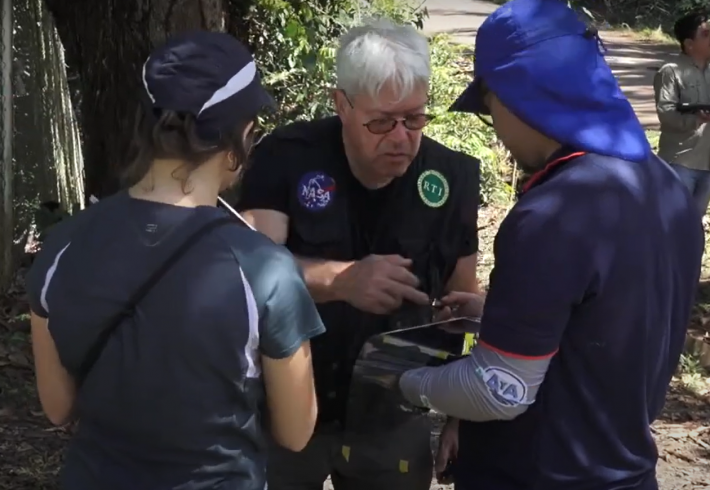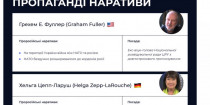Alain Gachet – Dr. Gachet is President of Radar Technologies International Exploration (RTI Exploration ) and inventor of the WATEX (Water Exploration) method for locating aquifers by satellite.
This is a synopsis of a video message from French water expert Dr. Alain Gachet, preceded by the edited introduction given by Jacques Cheminade, presented to Panel II, “Why It Is in the Strategic Interest of European Nations to Cooperate with the Global South,” of the Schiller Institute’s July 8-9 conference, “On the Verge of a New World War—European Nations Must Cooperate with the Global South!” Unable to attend in person, Dr. Gachet provided a video on the WATEX process, introduced by Jacques Cheminade, President of the Solidarité & Progrѐs Party, who gave the keynote to the panel.
Jacques Cheminade. Every day, water is and will become more and more an issue for world peace, peace based on integrated resource management and mutual development. In France, between 10% and 40% less water will be available in the coming years, and the challenge cannot be met by multiplying the number of large run-off basins.
On a global scale, a diagonal of thirst stretches from Tangiers to northeast China, passing through the whole of Southwest Asia. The challenge cannot be met simply by multiplying dams. It is a matter of life and death.
The urgency is immediate. Failure to act is criminal. The consumption of unsafe water causes over 2.5 million deaths a year worldwide. All the refugees to be found in the streets and under the bridges of Europe have one thing in common: they come from countries that are cruelly short of water: Sudan, Eritrea, Mali, Chad, Burkina Faso, Afghanistan, Syria and many others. Not to act is criminal, because there are solutions.
We can start with reducing water leakage, which is often enormous, stopping losses through unsealed soil channels, restoring wetlands where possible, recovering the precious liquid from wastewater treatment plants and subjecting it to additional treatment (filtration, disinfection by UV irradiation or chemicals) to eliminate toxic substances and any health risks. In France, less than 1% of wastewater is treated, compared with 8% in Italy, 14% in Spain and 85% in Israel.
However, all this is not enough, particularly in the poorest countries most affected.
The challenge is not to deprive the existing aquatic environment of too much water supply by redirecting flows. Similarly, the desalination of seawater, successfully used in Saudi Arabia and California, would be too energy-intensive on a global scale [under non-nuclear modes of power]. The retention of evaporating surface water today needlessly depletes underground resources for water-hungry agricultural practices. Beyond the useful but insufficient approaches I have just mentioned, my friend Alain Gachet tells us that water is waiting for us underground.
This underground water does not evaporate or pollute, and its resources are a hundred times greater than all the lakes and rivers on the Earth’s surface. It will enable us to make shared water the best weapon for peace and respect for life. It will also enable us to replant forests that are burning, and restore soils that are being depleted and eroded. Aquifers can be located by satellite (using X-rays) and the water can be pumped out with drilling tools that can go deep enough, just like the oil companies can do, but not the water management agencies. Clearly, it’s all a matter of political will: putting human life before immediate profit.
For 20 years now, Alain Gachet, his friends and collaborators have been fighting, from Darfur to Iraq, without forgetting Kenya and Costa Rica, to successfully test his means of action and make people realize that there are solutions that are not being implemented.
For the Schiller Institute, exploiting water resources for all is an essential element, along with a health system for all, for social justice and peace through mutual development. The West, which claims to be so concerned about the plight of women, must realize that access to water without having to travel long distances is the beginning of their liberation. Brice Lalonde, advisor on sustainable development at the United Nations, asserts that strong political will is needed and that “this requires the rapid implementation of an international agreement on groundwater, which accounts for 90% of the planet’s freshwater.”
I’ll now let Alain show you his approach, currently being tested in Niger as part of a vast program with the MCC (Millenium Challenge Corporation) in Washington, with no ulterior motive other than the joy of seeing water bring life for the common good.
Alain Gachet. A video produced by Radio Technologies International Exploration (RTI Exploration) was shown at the conference, which summarizes the WATEX system, its impact, and Dr. Gachet’s experience. (https://www.youtube.com/watch?v=Yn3W3zCBAVc&t=83s)
Synopsis by EIR of his video:
Radar Technologies International is a company specializing in the exploration of underground resources, focusing on resources to mitigate the deficit in surface drinking water. For nearly 20 years, RTI Exploration has been involved in the search for underground drinking water at the request of international organizations, such as the United Nations, and other major international institutions.
RTI Exploration, founded in 1999, invented the WATEX system, built on a solid foundation of scientific excellence, which combines in a complex algorithm, mega databases that are linked to a broad spectrum of geosciences, such as remote sensing, hydrology, geology, geophysics and climatology.
The WATEX system is a scalable and replicable scientific tool. Since its invention in 2004, it has been used to explore potable and renewable ground water resources. Nearly 2,700 wells have been drilled worldwide, with a 98% success rate. Its results have been audited and verified by institutions including the USGS (U.S. Geological Survey) and the U.S. Department of the Interior.
At present, surface water from lakes and rivers is no longer sufficient to meet the vital needs of the world’s population, given the weather patterns and circumstances of extreme droughts, advancing deserts, extreme floods, mega forest fires, all of which are aggravated by demographic pressure.
Groundwater has become the priority objective of the WATEX system, because groundwater is 100 times more abundant than surface water. Of the planet’s fresh water, 3% is surface water, and 97% is groundwater. Groundwater is the water of the future, provided that the consumption of this water is compensated for by the replenishment of resources through sustainable management.
Africa Focus, Other Projects
Faced with a worsening climatic distress, that is affecting all the countries in the Sahel zone, condemning seasonal crops, RTI Exploration’s activity is now focused on the development of sustainable, irrigated agriculture and forestation. The activity is in Niger, Kenya, and Ethiopia. In Chad, 250 wells have been drilled, over an area of 80,000 square kilometers. In Sudan, 1,700 wells have been drilled, with a 98% success rate.
In Kenya, there has been the discovery of the Turkana Aquifer, with an estimated 250 billion cubic meter capacity. RTI Exploration has launched its first “cluster of prosperity” in northern Kenya, in the arid Turkana region. This term refers to agricultural zones designed to guarantee water and food security for vulnerable populations. These communities commit themselves to running of decentralized, solar-powered agricultural projects. The resulting economic and environmental benefits are visible in just a few weeks, and help these communities to provide security to the people and their herds, around the agriculture projects.
On a broader scale, there are projects on other continents and for other purposes. The WATEX system allows for the development of master plans for land-use planning, such as has been done in Costa Rica, a country that lives off green tourism. The WATEX study of the entire nation, with the support of international institutions, including the USGS, has allowed for the planning of the decentralization of industrial infrastructure and activity, and the protection of the rainforest.
The WATEX system has demonstrated that the protection of the rainforests, afforestation programs, and monitoring of eco-system biodiversity are key to sustainability for the generations to come. The WATEX system is also key for the development of industry and strategic mining resources.
NASA Recognition
In conclusion, the WATEX system is a solution that leads to access to clean water for people and their herds; food security through sustainable, irrigated agriculture; energy autonomy for each production center; reforestation to reduce climatic extremes; practices to promote groundwater recharge; and measures to protect aquifers from evaporation and pollution, and protect soils from erosion.
Dr. Alain Gachet, mining engineer, physicist and geologist, is a talented researcher involved in the invention of the WATEX system. Over the decades, he has also held important responsibilities in the exploration-production activities of Elf Aquitaine in Kazakhstan, Syria and Qatar; served as Secretary General of Elf in Congo Brazzaville; and then as a game-changer in the research and innovation cell of Shell International.
RTI Exploration and the WATEX system were awarded induction into the Space Foundation (based in Colorado, U.S.A.) in 2016, on the recommendation of NASA, for improving the lives of millions of people around the world.











